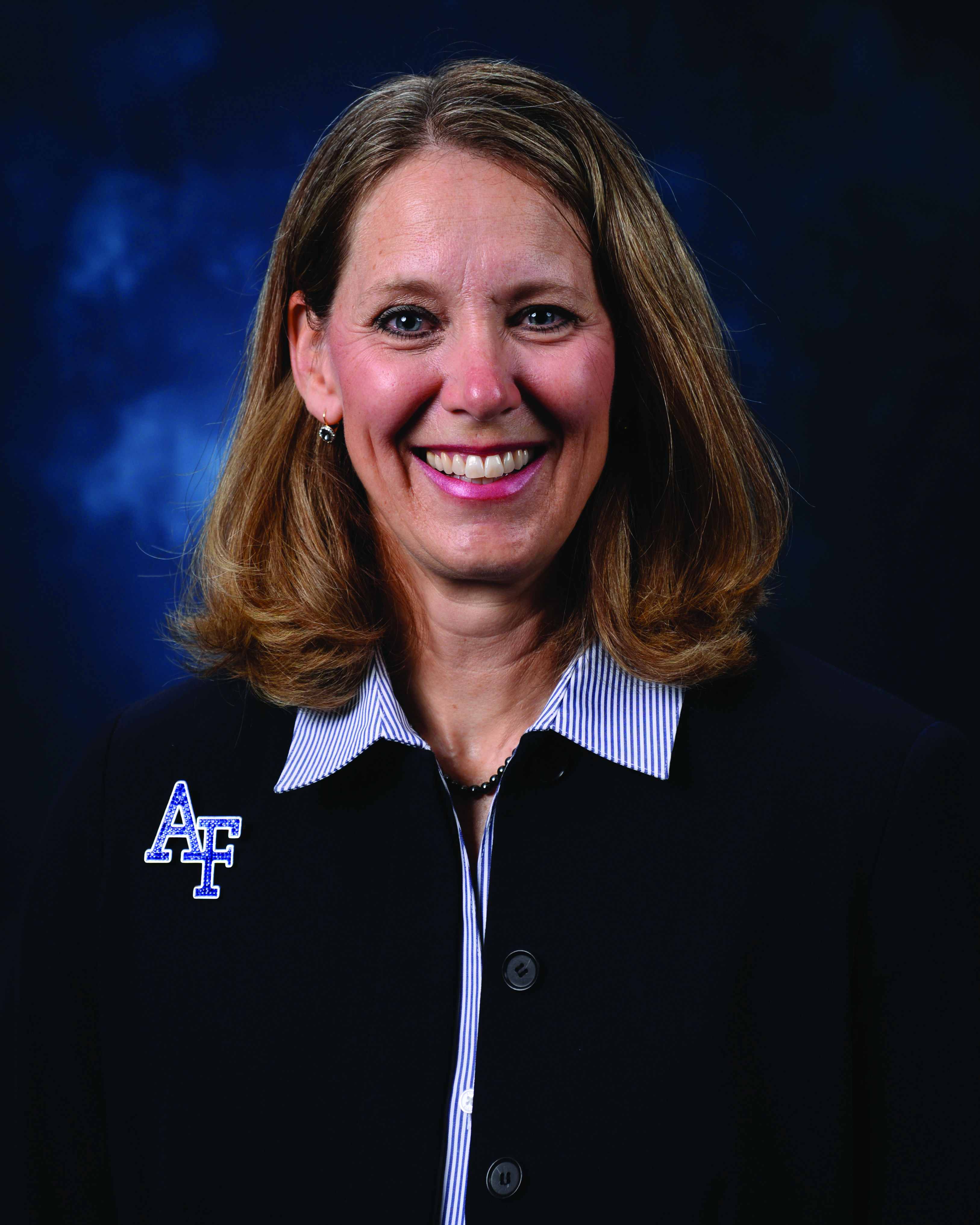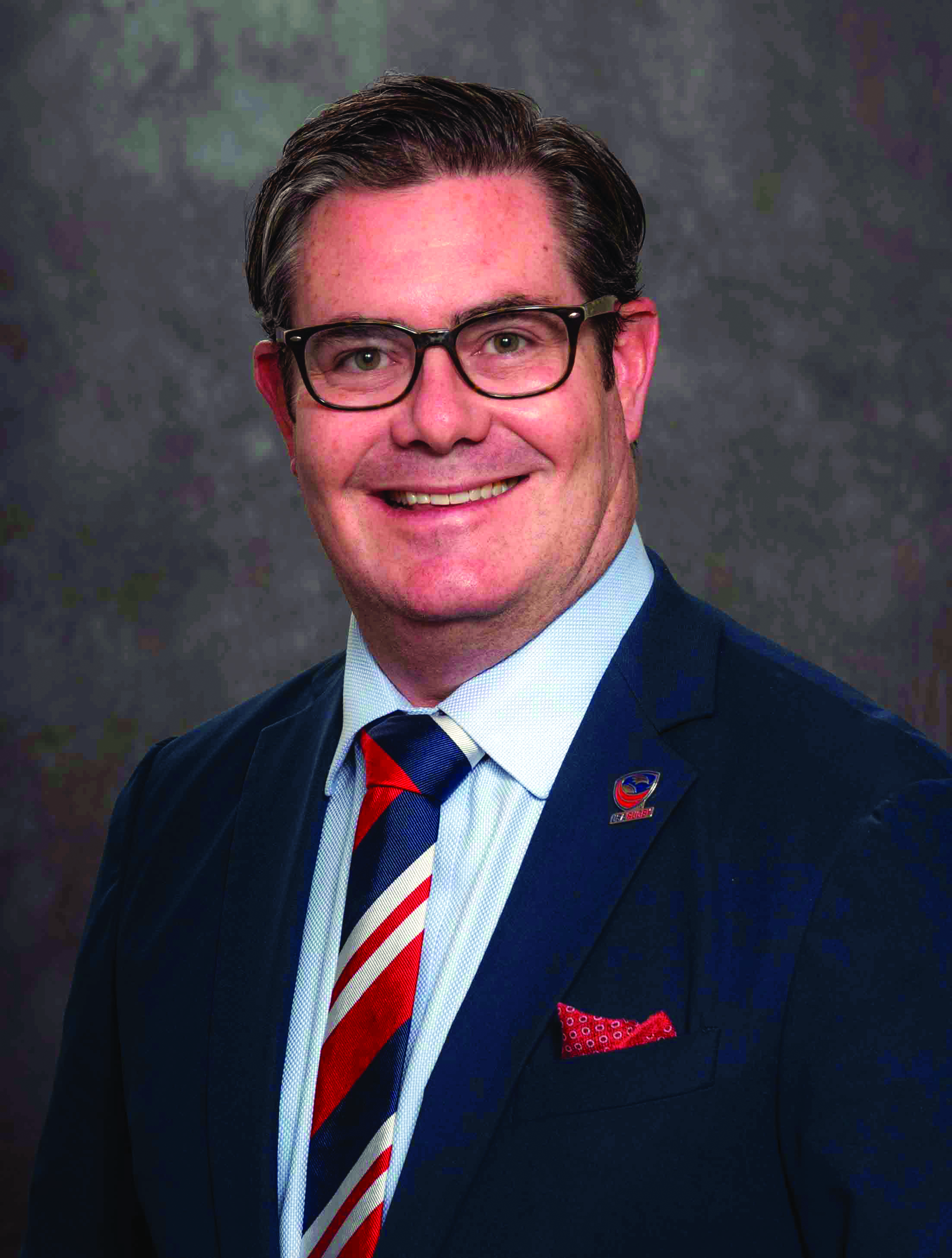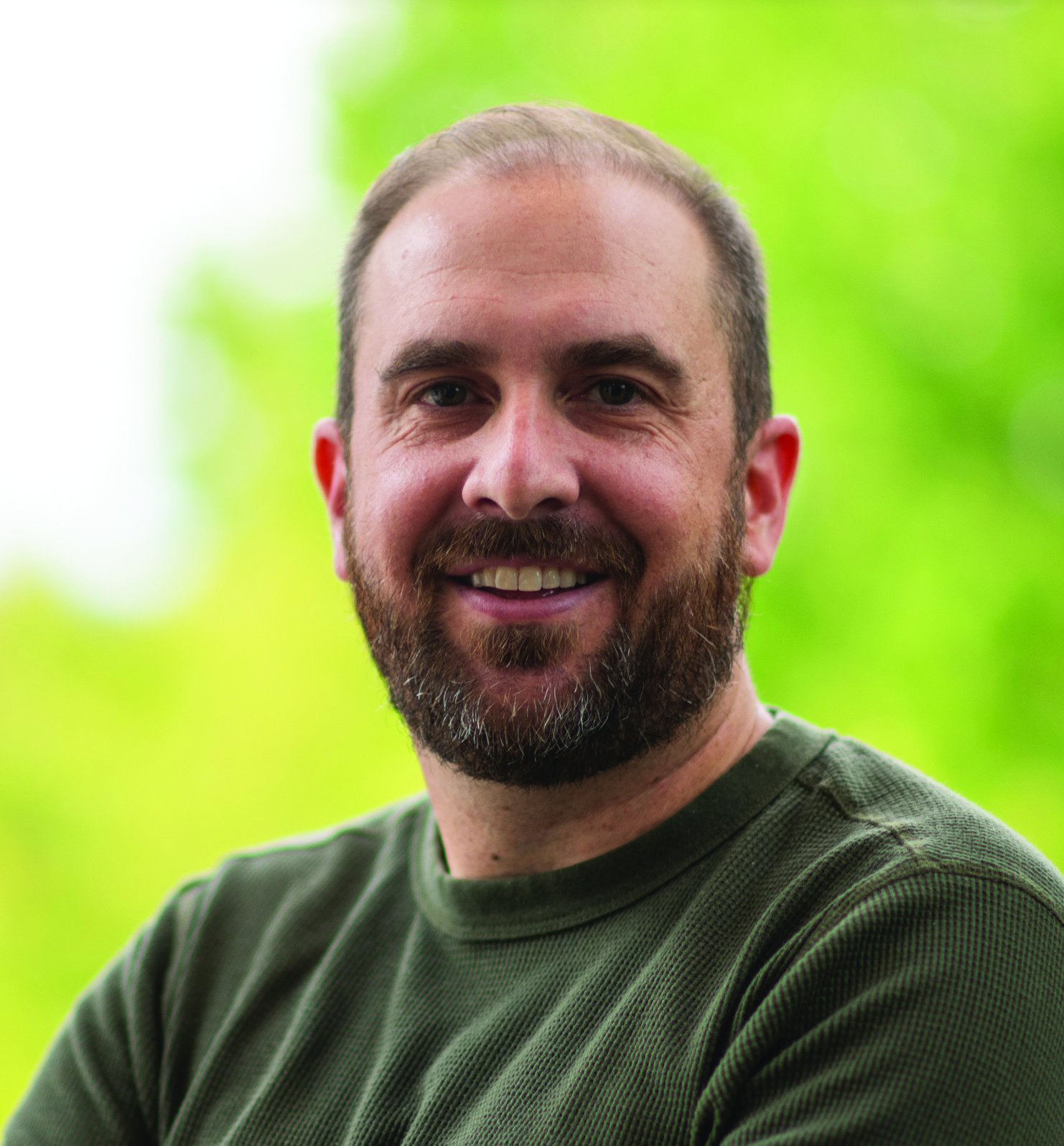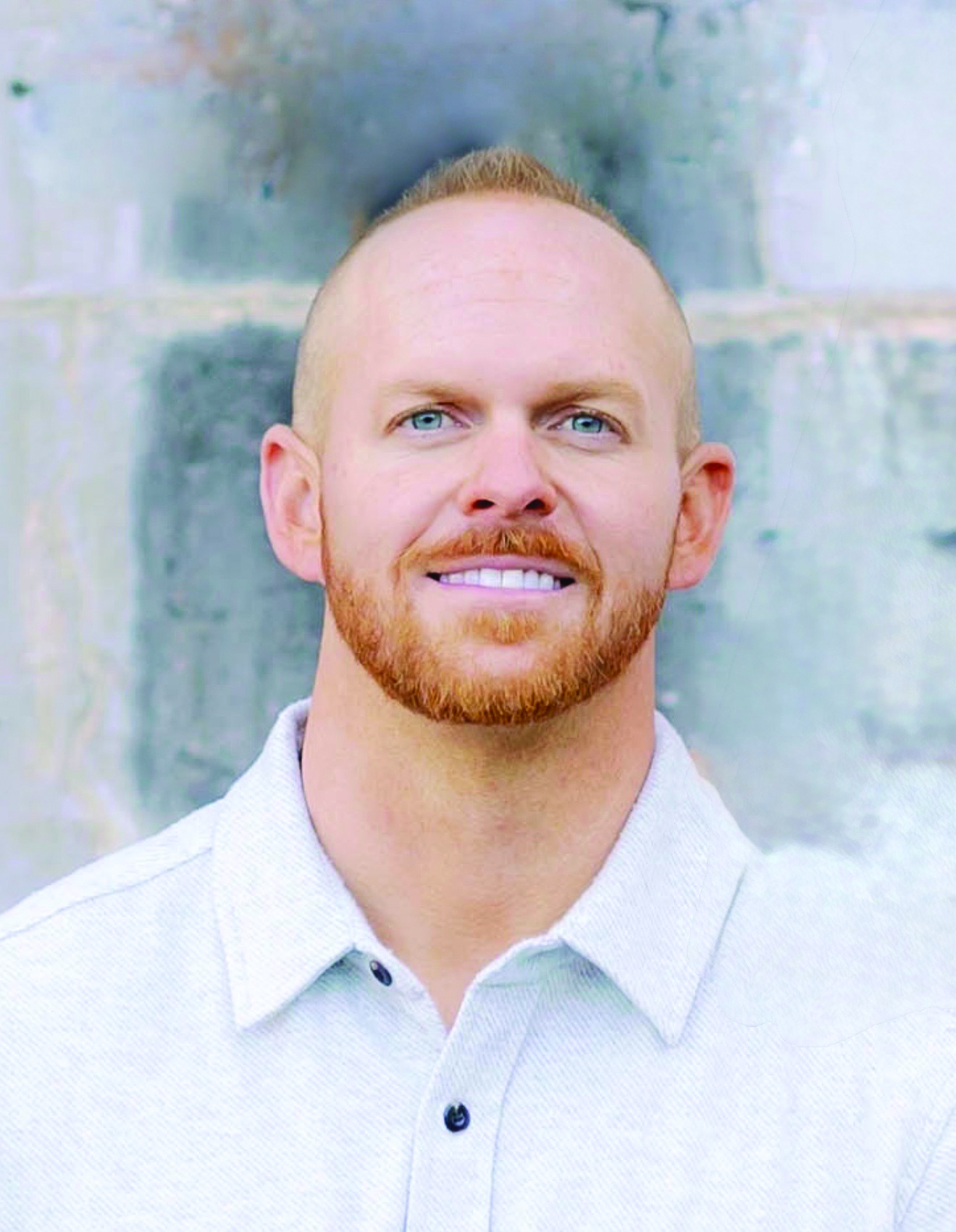Checkpoints: Game Changers
Five graduates transforming sports through leadership, innovation and heart
Some discover their calling through a single pivotal moment — a coach’s unexpected recruiting pitch, an unforeseen medical setback or the realization that passion lies on an entirely different playing field.
For five Air Force Academy graduates, those moments of clarity launched them toward athletic frontiers they never imagined, where military precision meets sports innovation. These graduates now stand at the forefront of sports transformation.
One tackles collegiate athletics administration from within. Another empowers executives to command rooms with championship presence. A third combines elite sports medicine with USA Rugby team physician duties. The fourth helps Nike navigate an ever-changing marketplace. The fifth revolutionizes how global talent discovers opportunity through cutting-edge technology.
Although their paths diverged, each carries forward the same foundational truth: Excellence isn’t negotiable.
Col. (Ret.) Jen Block '92
As a middle blocker for the U.S. Air Force Academy’s volleyball team, Col. (Ret.) Jen Block ’92 dominated in ways that defied her position.
While most middle blockers stayed at the net, Col. Block earned spots in the Academy’s top 10 for kills, blocks and digs.
“Back in the olden days, some middles did play back row,” she says. “I’m very proud of my defensive skills. I came to the Academy to play volleyball, and I stayed because I fell in love with the Air Force team.”
As a four-year letterman, team captain and most valuable player her firstie year, Col. Block also served as honor NCO and honor officer, developing leadership principles that would anchor her career.
“I learned the importance of relationships and taking care of people,” Col. Block says. “The mission always has to get done, and it’s the people who accomplish that. The better we took care of each other, the more successful we were.”

Block was a contracting officer for most of her career. In 1998, she was selected into the Air Force internship program, where she met her husband, Lt. Col. (Ret.) Denny Towns. Their journey had them at Ramstein Air Base on Sept. 11, 2001. Col. Block’s career highlight came when she deployed right after 9/11 as a contingency contracting officer to help establish a bare base at Karshi-Khanabad, Uzbekistan. “I’m really proud of the work we did to set up an operational base and begin flying missions in that arena,” Col. Block says.
After serving as air officer commanding at the Air Force Academy Preparatory School, Col. Block transitioned to the Air Force Reserve, serving another 12 years. She acted as the Academy’s athletic director from April 2018 to February 2019 before retiring that April, and soon after was hired into her current role as executive director of athletic programs. “I never could have drawn this up on the board, but it was an idyllic military career,” Col. Block says. Working with other athletic departments reinforces her appreciation for the Academy’s standards. “When I’m working with other athletic departments and hear what they go through, I realize how fortunate we are, because I don’t think integrity and service are core to everybody,” Col. Block says.
One critique she has about herself is that her competitive spirit remains strong today. “I’m super competitive. I hate to lose, and I love to win,” she says. Col. Block recently encouraged and helped several student-athletes secure pilot training slots by articulating the leadership experience they developed and demonstrated on the fields of friendly strife. Her philosophy centers on a core principle she advocates passionately. “The pressures felt in competitive athletics are considered to be the closest peacetime comparison to military combat,” Col. Block says. This drives her conviction that athletics serve as essential military training. “Individual character is forged by athletics,” Col. Block says. “I believe it is the best military training.”
Col. Block offers straightforward advice to current cadet-athletes. “Stop fighting the system. You’re here, buy in. As soon as you really buy in, in all areas, you will start to see real growth and your life will be much better,” Col. Block says. She emphasizes that military service becomes their identity in a way that civilian athletics can’t emulate. “We don’t take off our uniform at the end of the day and abandon our core values. It’s in our DNA,” she says. Col. Block’s message to Academy supporters centers on authentic competition. “We do college athletics like it’s supposed to be and how it was 25 years ago,” she says. “Our athletes are fierce competitors playing for each other, our school and the love of the game. We’re not always the biggest or the fastest, but we have the most heart out there.” The relationships built through Academy athletics endure.
Col. Block recently gathered with eight volleyball teammates, perpetuating relationships that began decades ago. “Those bonds we forged on the volleyball court are real,” Col. Block says. “We went to all of each other’s weddings, bridal showers and baby showers. Those bonds are really unique.” For Col. Block, Academy athletics represent something increasingly rare in modern college sports, and it’s very special. “Come out and watch and introduce your family to these great Americans; they will make you proud,” she says.
Tanji (Johnson) Bridgeman '97
A ninth-grade reality check in Columbia, South Carolina, launched Tanji (Johnson) Bridgeman ’97 on a journey of relentless self-determination that would carry her from the Air Force Academy to American Gladiators and ultimately to executive boardrooms. When her Army father sat her down that pivotal year, he explained there was no money set aside for her college. She was on her own. “That was it for me,” Bridgeman recalls. “That was the beginning of me truly taking responsibility for my life.”

While her classmates focused on teenage pursuits, Bridgeman charted a strategic path to higher education. And when traditional leadership positions weren’t available, she created her own and started a hip-hop dance team, appointing herself captain. “If you don’t have the opportunity in front of you, if nobody selects or invites you, go create your own,” Bridgeman says. “That’s always been a part of my story, being a creator and not someone who waits for opportunity.” Taking the SAT five or six times to meet Academy requirements, she eventually secured one of the final appointments. Bridgeman’s cadet experience defied typical Academy narratives. Rather than finding the rigid structure oppressive, she thrived in it. “I actually felt I had more freedom as a cadet than I did growing up in a strict upbringing,” she laughs.
As one of the first women to serve as group superintendent during the second Basic Cadet Training for the Class of 1999, she spoke to hundreds of new cadets nightly. “When people ask me where I got my gift for public speaking, I tell them it was from being on the amphitheater stage every night for two weeks,” Bridgeman says. Following commissioning, Bridgeman spent her first year as an Academy admissions adviser, eliminating any lingering impostor syndrome about her own Academy journey. “I used to feel like I didn’t deserve to be there, but now I get it,” she says. “The goal was to expand access to opportunities that had been out of reach for many communities.” Her aircraft maintenance career working on KC-135s at Fairchild Air Force Base, Washington, taught crucial leadership lessons. As a young lieutenant commanding over 200 people, she learned the value of humility and collaboration. After four years of military service, Bridgeman pivoted to professional fitness. For 18 years, she competed as a professional bodybuilder and fitness champion, winning 11 titles and eventually appearing on American Gladiators as the gladiator, Stealth.
When COVID shut down the fitness industry in 2020, Bridgeman viewed the disruption as an opportunity for reinvention. One current venture, Poised Like a Champion, a signature offering from her Empower Your Inner Champion brand, represents the evolution of two decades of bodybuilding expertise into executive presence coaching. “I realized, I don’t have to abandon a skillset I’ve already built so much credibility in. I just needed to pivot and shift my audience,” Bridgeman says. Executive presence, she explains, “is the ability to project confidence, credibility and clarity in the way you show up and the way you communicate so people trust you, want to follow you and thus allowing for more impact.” Her guiding philosophy emerged from an unlikely source. During muscle failure training, her trainer pushed her beyond her perceived limits, teaching her that “if you want to win, you’ve got to learn how to train through failure,” which revolutionized her mindset about setbacks. This lesson evolved into her signature question. What would you do if you knew you had to fail in order to succeed? “A lot of people will say, ‘What would you do if you knew you could not fail?’ Well, that doesn’t require any bravery, right?” she explains. “But what if you knew you had to fail in order to succeed? Then you would embrace failure and see it as the prequel to success.” For current cadets seeking to blend sports, leadership and business, Bridgeman’s advice centers on self-knowledge and authenticity. “Know who you are. When you align your identity, your strengths and your habits, you don’t just blend sports, leadership and business,” she says. “You excel in all three.” Her journey from the amphitheater stage to American Gladiators to executive coaching has taught her one fundamental truth. “You create your own opportunities,” she says.
Lt. Col. (Ret.) Dr. Matt Schmitz '00
A recruiting visit to the Air Force Academy changed everything for Lt. Col. (Ret.) Dr. Matt Schmitz ’00 when then-head football coach Fisher DeBerry shared there was a way to fund his medical school dreams. The Air Force would pay for it in exchange for a service commitment. “That sounded like a great deal for me,” Dr. Schmitz recalls. “I’ve known I wanted to be a physician ever since I was a little kid.” That decision launched a remarkable journey spanning two decades of military service, elite sports medicine and international rugby.

Today, Dr. Schmitz serves as a hip preservation and adolescent sports surgeon at Rady Children’s Hospital in San Diego, California; clinical professor at UC San Diego; and a USA Rugby team physician. Dr. Schmitz’s Academy experience began on the football field but flourished on the rugby pitch. After switching sports his sophomore year at the Academy, he discovered his passion in rugby. “I fell in love with the sport,” he says. The transition proved transformative, teaching discipline and time management while maintaining academic excellence as a biology major.
“Being pre-med and getting good grades while traveling with rugby set me up for success long term,” he says. As co-captain his senior year, Dr. Schmitz developed leadership skills he draws on today in both sports and medicine. “Team sports are a leadership laboratory and the Academy stressed that,” he says. Dr. Schmitz attended medical school at Loyola University Chicago (Illinois) and completed his orthopedic surgery residency training at Lackland Air Force Base in San Antonio, Texas. His distinguished military career included two years at Andrews Air Force Base, Maryland, a fellowship in pediatric orthopedics at UC San Diego, and 12 years in San Antonio, where he became the first Air Force chair of the Department of Orthopedics at Brooke Army Medical Center. But rugby remained a constant thread throughout his career. After playing for the Chicago Lions and representing USA Rugby in Russia in 2003, Dr. Schmitz reconnected with the U.S. men’s and women’s national teams in 2012 as a team physician. “It’s been very rewarding,” he says. “The men’s head coach is a player that I played with back in the day. He’s a good friend, and it’s fun to work with him.”
After retiring from the Air Force in 2024, Dr. Schmitz returned to UC San Diego, where his current practice focuses on adolescent athletes, knee injuries, ACL tears and hip preservation surgery. “I love the interactions I have with kids and their families,” he says. When reflecting on the Air Force core values, Dr. Schmitz says service before self resonates with him. “As a physician, as a surgeon, I give a lot to my patients,” he says. For current cadets interested in blending sports and leadership into their careers, Dr. Schmitz offers clear guidance. “Take those little leadership lessons that you learn on the sports field and file them away because you’ll use them the rest of your life,” he says. His personal motto — tough times never last; tough people do — reflects resilience developed through years of competition and medical training.
“We all have adversity in our lives, and how you overcome that adversity is really how you write your story,” he says. And the Academy, he says, is part of his story. Despite initially stepping away from Academy involvement after graduation, Dr. Schmitz rediscovered his connection during a 2007 visit. “I really fell back in love with the Academy,” he says. “I would encourage folks to remain involved with the Academy because it really is a close subset of folks that you will remain close with as you’re dispersed around the globe.” As he approaches his 25th reunion this fall, Dr. Schmitz continues treating young athletes while traveling with the USA Rugby team. “I joke that it makes me continue to feel young, because being around these 22- to 27-year-old athletes makes me feel like I’m not creeping up on my 50s,” he laughs.
Dan Walsh '04
When Dan Walsh ’04 was deciding between colleges, he did what any analytically-minded future Air Force officer would do: He created a decision matrix. The Air Force Academy won. That methodical decision-making process would later serve Walsh well as he navigated an unconventional career path from an Air Force intelligence and acquisitions officer to the soccer community and, eventually, a job at Nike. But Walsh’s connection to the Academy ran deeper than spreadsheet analysis. He attended Air Academy High School — located on the Academy’s base — and had played club soccer for longtime former USAFA coach Lou Sagastume, who recruited him.

During his cadet years, the soccer team achieved national prominence. It ranked 19th in the country overall, with a top 10 scoring offense, during Walsh’s sophomore year. He was also named conference player of the week on numerous occasions. At USAFA, the team was uniquely Colorado Springs, with the starting lineup featuring five or six local players from rival high schools who had grown up competing against each other before uniting as Falcons. As a human factors engineering major and student-athlete, Walsh learned lessons that proved invaluable throughout his career. “As a student-athlete, time management was essential,” he says. More importantly, the Academy taught him to seek advice from others. “Part of being a leader is knowing you don’t have all the answers, and asking other people for guidance and help to make the best decisions isn’t a sign of weakness; it’s a strength,” he says.
After graduation, Walsh served as an intelligence officer in Nevada, supporting new technologies in the Global War on Terrorism and as an acquisitions officer serving in Boston, protecting Air Force assets globally. “The job was not only dynamic, but I also appreciated that the work we were doing directly contributed to helping keep our country safe,” he said. But Walsh’s true passion remained in the sports industry. During Walsh’s time in uniform, he played numerous seasons on the U.S. Air Force military team and was selected to the national team in 2010, which competed at the Military World Games qualifying tournament in Suriname. He trained in Lake Placid, New York, as a national development athlete in the sport of skeleton and began coaching various club soccer teams. This passion would ultimately lead him to separate from the military. Taking a calculated risk, Walsh worked as an assistant coach at Colorado College in Colorado Springs for one season before pursuing a master’s degree in sports management at Georgetown University. While getting his master’s, Walsh interned for the Major League Soccer club D.C. United before running the club’s youth camps and training programs. Meantime, he coached D.C. United’s 11- and 12-year-old youth teams. Walsh took another leap of faith when he and his wife, Hadley, decided to move to the Pacific Northwest without jobs in pursuit of a career at Nike — a goal he aspired to post-military service.
A conversation with a fellow veteran led to a contractor position at Nike that eventually became full-time in 2016. Over nine years at Nike, Walsh has experienced the company’s dynamic culture firsthand — always pushing the boundaries while focused on the concept that everyone is an athlete. “It’s the classic Nike way. We try new innovative things and if they don’t work, we pivot,” he says. Currently serving as director of business operations and enablement within global technology, Walsh and his team support day-to-day operations for an organization made up of engineering program and product talent through communications, strategic planning, data and visualization management and engagement. Walsh’s leadership approach at Nike draws heavily from Academy values, particularly integrity and grit. “If you can bring integrity into an organization — always do the right thing no matter who’s looking, and never give up — people definitely respect that,” he says. He’s also maintained a military perspective about the relative importance of corporate work. “While serving, you aren’t worried about revenue and stock prices,” he says. “You are meant to do your job to the best of your ability, with the end goal of ultimately keeping humans safe. That is your stock price. When you join the corporate world, like Nike, this military perspective of service for others will strengthen your team’s resolve in any situation.”
Walsh’s leadership philosophy centers on
building relationships through kindness.
“Don’t mistake kindness for weakness,”
is one of his favorite quotes.
He explains that treating people with
kindness is a strength that attracts others.
Leading teams at Nike means fostering the same collaborative spirit he found
valuable as a young cadet soccer player.
“I love interpersonal relationships, and
if you have real relationships with people,
the work takes care of itself,” he says.
For Academy graduates considering
similar career transitions, Walsh offers
practical advice: “Reach out to people and
have a conversation. I was able to get my
role at D.C. United and my job at Nike
by reaching out to people who I respected
and appreciated.”
Perhaps most importantly, Walsh encourages fellow graduates to embrace calculated risks.
“I think people can get a little bit afraid
of taking the risk to do something different, particularly outside of government
work,” he says. “Sometimes you have to
do what your heart and gut tell you. With
high risk comes high reward. I will be forever indebted to the opportunity that the
Academy and the military provided for me personally and professionally."
Connor Dietz '12
A humbling phone call from a frustrated NCO at Florida’s MacDill Air Force Base changed everything for Connor Dietz ’12. The young logistics officer had answered a question with “I think so,” prompting an immediate lesson in military precision. “He said, ‘I’m so sick and tired of all you young officers coming in with ‘I think so.’ Only tell me if you know it,’” Dietz recalls. That moment proved foundational for the former Air Force Academy quarterback who later co-founded GMTM (pronounced gametime), an interactive social platform revolutionizing how athletes and sports organizations discover opportunities beyond traditional pathways.

Dietz led his nationally ranked high school football team to an Ohio state title, earning him a spot on the Falcons football squad as part of the first recruits under Coach Troy Calhoun ’89. “From Day 1 at the Academy, I picked up on the excellence around me,” Dietz says. “I was surrounded by people who aspired to so much more.” As a Falcons quarterback, Dietz learned leadership principles that guide his entrepreneurship: toughness, authenticity, putting in the work and trusting his instincts. He served five years as a logistics readiness officer at MacDill AFB, gaining exposure to various missions. “Working with all the different career fields while doing logistics was kind of like being a quarterback,” Dietz says. “You get the ball every play while working with everyone and seeing the whole field. You’re touching everything from the planes to the fuel to the operations to the personnel.” While on active duty, fate intervened when Dietz presented an impromptu lecture at the University of Tampa’s entrepreneurship program. University employee Kevin Moore saw potential and offered mentorship. “You don’t know much about entrepreneurship at the moment, but I can see that you’re inspired by it,” he remembers Moore saying. That meeting launched an unofficial two-year education in entrepreneurship.
Before leaving the Air Force, former Tampa Bay Buccaneers GM Mark Dominic recruited Dietz to an education technology startup. Two years later, he cofounded GMTM. Now celebrating its sixth year, GMTM connects athletes with organizations from Team USA to NASCAR to WWE and beyond. The technology company began as something like Zillow, but for sports, aggregating publicly available data across all sports globally. Coaches input criteria and filters to identify recruiting prospects, while athletes create profiles showcasing their metrics.
Adjusting to pandemic restrictions, GMTM pioneered online tryouts and combines. “We’ve truly transformed the way a lot of these large organizations recruit,” Dietz says. “Coaches and teams can own and operate their entire recruiting funnel without leaving their main site, where previously they were exhausting tons of resources on travel and hosting events.” GMTM’s technology centralizes fragmented sports data while creating what Dietz calls a spider web of connections and opportunities. The company’s all-sports approach helps athletes understand where their talents translate across disciplines. “One cool success story is a former collegiate runner who is now on Team USA’s Olympic bobsled team,” Dietz says. “We have countless stories where athletes were super talented in one sport but have now transitioned and are professionals in other sports through our platform.” The platform also supports the Academy’s candidate fitness assessment, providing video validation alongside scores.
For cadets interested in blending sports
and business, Dietz offers Academyforged advice: “Just get started. It’s very
easy to overthink. If you follow the breadcrumbs and put in the work, you’re going
to get where you want to be.
“And remember, it’s OK not to know
an answer,” he adds. “Go figure it out and
have confidence in all you do.”

